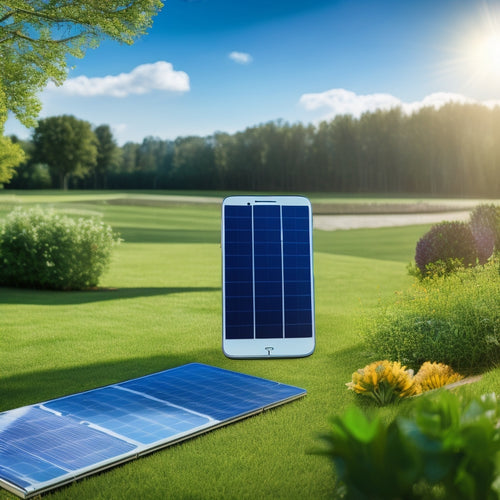
Diagnose and Fix RV and Fleet Vehicle Issues Online
Share
You're faced with a solar-powered RV or fleet vehicle issue, and you need to diagnose and fix it fast. Start by identifying common solar panel problems, such as dust accumulation, physical damage, or wiring issues. Understand how your vehicle's electrical system works, including batteries, alternators, and accessories. Then, leverage online tools and resources, like solar software and forums, to troubleshoot and analyze performance data. With the right digital resources, you can diagnose solar panel system failure, read error codes, and prioritize repairs. Now, take the next step to mastering online diagnostics and get back on the road sooner.
Key Takeaways
• Utilize online tools and software for monitoring and analyzing solar panel performance to identify potential issues.
• Consult online forums, tutorials, and communities for troubleshooting guides and collective knowledge on solar repairs.
• Leverage energy analytics to identify areas of improvement and make informed decisions for optimal energy output.
• Perform circuit analysis and consult wiring diagrams to diagnose electrical problems in RV and fleet vehicles.
• Access online resources, such as error code databases, to prioritize responses and resolve issues promptly.
Identifying Common Solar Panel Issues
When you're relying on solar panels to power your RV or fleet vehicle, even slight malfunctions can have a profound impact on your energy supply, so it's important to identify common issues promptly.
Regular solar panel inspection is key to detecting potential problems before they escalate. One common issue is dust accumulation, which can greatly reduce energy output. A thin layer of dust can decrease energy production by up to 20%. Perform regular cleaning to prevent dust buildup and maintain peak energy generation.
During your solar panel inspection, also look for signs of physical damage, such as cracks or broken glass, which can compromise the panel's integrity. Check the connections and wiring for signs of wear or corrosion, as these can cause electrical issues.
Keep an eye out for signs of overheating, which can reduce the panel's lifespan. By staying vigilant and addressing these common issues promptly, you can ensure a reliable energy supply and extend the lifespan of your solar panels.
Understanding Vehicle Electrical Systems
Your RV or fleet vehicle's electrical system is a complex network of components, including batteries, alternators, and electrical accessories, that work in tandem to power your vehicle's systems and appliances.
Understanding how these components interact is essential for diagnosing and fixing electrical issues. To do this, you'll need to perform circuit analysis, which involves tracing the flow of electricity through your vehicle's wiring.
This can be facilitated by consulting wiring diagrams, which provide a visual representation of your vehicle's electrical circuitry.
Online Tools for Troubleshooting Solar
You can leverage online tools to troubleshoot solar issues in your RV or fleet vehicle, saving time and reducing frustration. With the rise of solar-powered systems in vehicles, it's vital to have reliable online tools to diagnose and fix solar-related problems.
Solar software can help you monitor and analyze your solar panel's performance, detecting potential issues before they become major problems. Energy analytics play a significant role in identifying areas of improvement, allowing you to optimize your solar system for maximum efficiency.
Online tools can also provide you with real-time data on energy production, consumption, and storage, enabling you to make informed decisions about your solar setup. By utilizing these online tools, you can troubleshoot solar issues efficiently, ensuring your RV or fleet vehicle operates safely and efficiently.
With the right online tools, you can minimize downtime, reduce maintenance costs, and get back on the road quickly.
Reading Error Codes and Warnings
Error codes and warnings on your RV or fleet vehicle's solar system dashboard can be a major headache, but understanding what they mean is key to resolving issues quickly and getting back on the road.
When you encounter an error code or warning, it's vital to understand the severity of the issue and prioritize your response accordingly. That's where code explanations come in. You'll want to consult your vehicle's manual or online resources to decipher the code and determine the root cause of the problem.
Warning prioritization is also important, as some issues may be more critical than others. By understanding the urgency of each warning, you can focus on the most critical problems first and address them efficiently.
Diagnosing Solar Panel System Failure
Identifying the root cause quickly is vital when a solar panel system failure occurs, to minimize downtime and prevent further damage. As the system's energy harvesting capabilities are compromised, every minute counts.
When diagnosing a solar panel system failure, you'll want to follow a structured approach to guarantee a swift and accurate diagnosis.
Here are the essential steps to take:
-
Conduct a thorough Solar Panel Inspection: Inspect the panels for signs of physical damage, corrosion, or debris accumulation.
-
Check electrical connections: Verify that all electrical connections are secure and not damaged.
-
Monitor system performance data: Analyze system performance data to identify patterns or anomalies that may indicate the root cause of the failure.
Remote Monitoring for Solar Issues
When you're dealing with solar-powered RVs or fleet vehicles, you know how important it's to keep tabs on your solar panel performance.
That's where remote monitoring comes in - it lets you track your system's energy output in real-time, identifying potential issues before they become major problems.
Solar Panel Performance
How can you guarantee your solar panels are operating at peak performance, especially when you're not on-site to monitor them? With remote monitoring, you can assure your solar panels are generating the maximum amount of energy possible.
Here are 3 key benefits of remote monitoring for solar panel performance:
-
Real-time monitoring: Receive instant notifications of any performance issues, allowing you to address problems promptly.
-
Data-driven insights: Analyze energy harvesting data to optimize your solar panel's performance and maximize energy efficiency.
-
Proactive maintenance: Identify potential issues before they cause downtime, ensuring your solar panels operate at peak performance.
Monitoring System Benefits
By utilizing remote monitoring, you can access a range of benefits that help minimize solar panel downtime and optimize energy harvesting. This proactive approach enables you to identify and address potential issues before they escalate, guaranteeing maximum system uptime.
With remote monitoring, you can tap into valuable data insights that provide a thorough understanding of your solar panel's performance. This real-time data enables you to pinpoint areas of improvement, make data-driven decisions, and maximize energy production.
Additionally, remote monitoring allows you to detect anomalies and irregularities, enabling swift corrective action to prevent system failures. By staying on top of your solar panel's performance, you can reduce maintenance costs, minimize downtime, and ensure a safe and reliable energy supply.
With remote monitoring, you're empowered to take control of your solar panel's performance, making data-driven decisions that drive efficient energy harvesting and system uptime.
Detecting Energy Loss
Through remote monitoring, you can pinpoint energy loss in real-time, allowing you to identify and address issues before they significantly impact your solar panel's performance. This proactive approach guarantees that your system operates at peak levels, reducing the risk of downtime and costly repairs.
To detect energy loss, you can leverage the following tools:
-
Energy audits: Conduct regular energy audits to identify areas of inefficiency and opportunities for improvement.
-
Power meters: Install power meters to track energy consumption and detect anomalies in real-time.
-
Remote monitoring software: Utilize remote monitoring software to track your solar panel's performance and receive alerts when energy loss is detected.
Solar Panel Maintenance Schedules
Schedule regular solar panel maintenance to guarantee maximum energy harvesting, as a neglected system can lead to reduced performance and shortened lifespan. You'll want to create a maintenance schedule that includes regular cleaning routines to remove dirt, dust, and debris that can reduce energy output.
A good rule of thumb is to clean your solar panels every 2-3 months, or more often if you're parked in an area with high pollution or dust levels.
In addition to cleaning, you should also make seasonal adjustments to optimize energy production. During the summer months, adjust your solar panels to a steeper angle to maximize energy harvesting. In the winter, adjust them to a shallower angle to reduce snow accumulation and maintain consistent energy production.
Troubleshooting Solar Charge Controllers
When you're troubleshooting solar charge controllers in your RV or fleet vehicle, you'll need to identify faulty controllers and pinpoint common issues.
You'll want to start by checking the controller's display or indicator lights for error codes or warning signs.
From there, you can begin to diagnose and repair or replace faulty components to get your solar power system back up and running.
Identifying Faulty Controllers
Identifying a faulty solar charge controller is crucial for maintaining system efficiency and preventing damage to other components or electrical shock. Promptly recognizing faulty controllers is key to avoiding these risks.
Here are three key signs of controller failure:
-
Inconsistent voltage readings: If the voltage output of your solar charge controller is inconsistent or fluctuating, it may indicate a faulty controller.
-
Unusual heat generation: If your controller is excessively hot to the touch or producing a burning smell, it may be malfunctioning.
-
Circuit analysis: Conduct a circuit analysis to identify any unusual current flows or voltage drops that could indicate a faulty controller.
Troubleshooting Common Issues
What specific symptoms should you look for to diagnose and repair a malfunctioning solar charge controller? Look out for signs of battery drain, overheating, or unusual noises. If you notice any of these symptoms, it's important to act promptly to prevent further damage to your RV or fleet vehicle's electrical system.
Here's a troubleshooting guide to help you identify common issues:
| Symptom | Possible Cause | Solution |
|---|---|---|
| Battery Drain | Faulty solar charge controller or incorrect installation | Check controller settings, wiring, and connections. Verify proper installation and configuration. |
| Overheating | Blocked air vents or malfunctioning temperature sensor | Ensure good airflow around the controller. Check temperature sensor functionality and replace if necessary. |
| Unusual Noises | Loose connections or faulty components | Inspect connections and tighten loose ones. Replace faulty components, such as capacitors or fuses in the fuse box. |
Online Resources for Solar Repair
Numerous online forums and tutorials dedicated to solar repair are available at your fingertips, providing access to a wealth of information and troubleshooting guides. You can tap into the collective knowledge of experienced solar repair professionals and DIY enthusiasts who share their expertise and experiences online. This valuable resource helps you identify and fix common issues, ensuring your solar panels operate efficiently and safely.
Here are three online resources to get you started:
-
Solar Forums: Websites like SolarForum.net and RenewableEnergyForum.com offer a platform for discussing solar-related topics, including repair and maintenance. You can ask questions, share your experiences, and learn from others in the community.
-
Online Communities: Join online groups like Facebook's Solar Power Forum or Reddit's r/SolarPower to connect with like-minded individuals, ask questions, and get advice from experienced solar enthusiasts.
-
YouTube Tutorials: Channels like Solar Repair Tutorials and DIY Solar offer step-by-step guides and tutorials on solar panel repair, maintenance, and installation. These visual aids can help you better understand complex repair procedures.
Preventing Future Solar Panel Issues
To guarantee future solar panel issues are minimized, you'll want to prioritize regular maintenance checks to identify potential problems before they escalate.
Adjusting the panel angle and tilt can also greatly impact energy output, so it's crucial to get these settings just right.
Regular Maintenance Checks
By incorporating regular inspections into your RV's maintenance routine, you can identify and address potential solar panel issues before they escalate into costly problems.
Regular maintenance checks are important to prevent future solar panel issues. By staying on top of routine tasks, you can guarantee your RV's systems are functioning properly.
Here are 3 essential checks to include in your maintenance routine:
-
Oil changes: Regular oil changes are essential to maintain the health of your RV's engine. Make sure to check your owner's manual for the recommended oil change interval.
-
Tire pressures: Proper tire pressure can improve fuel efficiency, handling, and safety. Check your tire pressures at least once a month, and before long trips.
-
Battery maintenance: Keep your batteries in top condition by checking the electrolyte levels, cleaning terminals, and ensuring proper charging.
Panel Angle and Tilt
It's important to make sure your solar panels are angled and tilted correctly to maximize energy production and prevent future issues. Incorrect panel angle and tilt can lead to reduced energy output, overheating, and even panel damage. To avoid these problems, you should make certain your solar panels are installed at an ideal orientation that takes into account your location's latitude and the time of year.
For RVs and fleet vehicles, adjustable mounts are a great solution. These mounts allow you to adjust the angle and tilt of your solar panels to achieve peak energy production, regardless of your location.
Frequently Asked Questions
Can I Use a Multimeter to Test My Rv's Electrical System?
"Did you know 75% of RV electrical issues stem from faulty wiring? You can use a multimeter to test your RV's electrical system, performing voltage checks and circuit analysis to identify issues, ensuring your safety on the road."
How Do I Reset My Vehicle's Error Codes After Repair?
After repairing your vehicle, you'll need to reset the error codes using a code scanner, which will clear the fault codes and update your vehicle's repair history, ensuring a safe and reliable ride.
Are Online Diagnostic Tools Compatible With My Older RV Model?
Like a master puzzle solver, you're wondering if online diagnostic tools fit your older RV model like a glove. Fortunately, many modern tools cater to vintage RV generations, offering seamless compatibility, so you can breathe easy and get back on the road.
What Causes My Rv's Solar Panels to Drain the Batteries at Night?
You're wondering why your RV's solar panels drain the batteries at night. It's likely due to inefficient Solar Panel Efficiency, causing unnecessary Nighttime Power Consumption, which can be hazardous if not addressed promptly to guarantee your safety on the road.
Can I Fix My Rv's Electrical Issues Without Professional Help?
"Imagine finding your RV's electrical system in shambles after a night of camping - frustrating! But, with DIY confidence, you can tackle electrical issues yourself, overcoming electrical anxiety; start by identifying faulty wiring or loose connections, and you'll be back on the road in no time."
Related Posts
-

Why Choose Cool Roofs in Scorching Climates?
You opt for cool roofs in scorching climates because they enable you to reclaim control over your energy consumption ...
-

3 Earth-Loving Furniture Tips for Energy-Smart Homes
When furnishing your energy-smart home, you have the power to reduce your carbon footprint greatly by making consciou...
-

7 Best Solar Panel Upkeep Apps for Homeowners
You can optimize your solar panel's energy output and efficiency by up to 20% with regular maintenance, which is wher...


